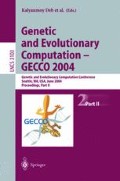Abstract
The software testing has gained importance and can be considered a fundamental activity to ensure the quality of the software being developed. In the literature, there are three groups of testing techniques proposed to reveal a great number of faults with minimal effort and costs: functional technique, structural technique and fault-based technique. These techniques are generally associated to testing criteria. A criterion is a predicate to be satisfied to consider the testing activity ended and the program tested enough [3]. The criterion generally requires the exercising of certain elements of the source code (decision statement) called required elements. To satisfy a testing criterion (coverage of 100%), it is necessary to provide input data to execute paths that exercise all the required elements. This is a very hard task because it is not possible its complete automatization due to several testing limitations.
Access this chapter
Tax calculation will be finalised at checkout
Purchases are for personal use only
References
Chaim, M.L.: POKE-TOOL - Uma Ferramenta para Suporte ao Teste Estrutural de Programas Baseado em Análise de Fluxo de Dados. Master Thesis, DCA/FEEC/Unicamp, Campinas - SP, Brazil (April 1991) (in Portuguese)
Delamaro, M.E., Maldonado, J.C.: A tool for the assesment of test adequacy for c programs. In: Proceedings of the Conference on Performability in Computing Systems, East Brunswick, New Jersey, USA, July 1996, pp. 79–95 (1996)
Rapps, S., Weyuker, E.J.: Selecting software test data using data flow information. IEEE Trans. on Soft. Engineering SE-11(4), 367–375 (1985)
Wegener, J., Baresel, A., Sthamer, H.: Evolutionary test environment for automatic structural testing. Information and Software Technology 43, 841–854 (2001)
Author information
Authors and Affiliations
Editor information
Editors and Affiliations
Rights and permissions
Copyright information
© 2004 Springer-Verlag Berlin Heidelberg
About this paper
Cite this paper
Ferreira, L.P., Vergilio, S.R. (2004). TDSGen: An Environment Based on Hybrid Genetic Algorithms for Generation of Test Data. In: Deb, K. (eds) Genetic and Evolutionary Computation – GECCO 2004. GECCO 2004. Lecture Notes in Computer Science, vol 3103. Springer, Berlin, Heidelberg. https://doi.org/10.1007/978-3-540-24855-2_165
Download citation
DOI: https://doi.org/10.1007/978-3-540-24855-2_165
Publisher Name: Springer, Berlin, Heidelberg
Print ISBN: 978-3-540-22343-6
Online ISBN: 978-3-540-24855-2
eBook Packages: Springer Book Archive

